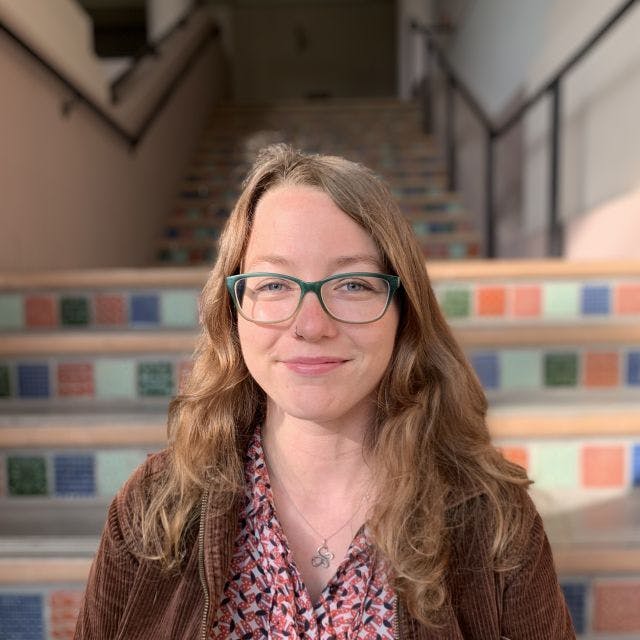The Gordon Hammes Scholar Award honors young scientists responsible for the very best papers published in Biochemistry.

The Gordon Hammes Scholar Award honors young scientists responsible for the very best papers published in Biochemistry. The winner of this year’s award is Dr. Candice Crilly, from The University of California, Santa Barbara. She will present the Gordon Hammes Scholar Award Lecture during the ACS Spring 2023 Meeting & Exposition March 26 – 30 in Indianapolis, IN.

Established in 2017 and awarded alongside the Gordon Hammes Lectureship Award, the Scholar Award seeks to recognize those at the bench – undergraduates, graduate students and postdocs – for the outstanding work they do. The award is sponsored jointly by Biochemistry and the ACS Division of Biological Chemistry.
Crilly was selected as the 2022 winner based on her 2021 article, “Dried Protein Structure Revealed at the Residue Level by Liquid-Observed Vapor Exchange NMR,” co-authored with Julia A. Brom, Mark E. Kowalewski, Samantha Piszkiewicz, and Gary J. Pielak.
Candice developed a technique called LOVE NMR (yes, it’s true), where LOVE stands for Liquid-Observed Vapor Exchange. This method provides residue-level information on the structure and interactions of dehydrated proteins. It was used to study how mutation affects dry protein structure, and will help scientists develop a more complete understanding of how dehydration impacts protein structure and function. She is a fantastic choice for the Gordon Hammes Scholar Award.
Read a brief interview with Gordon Hammes Scholar Award Winner, Dr. Candice Crilly
Can you give us a short overview of the research you are currently undertaking?
I am currently working as a post-doctoral researcher in Professor Songi Han’s lab at the University of California, Santa Barbara, where I’m using magnetic resonance techniques to study ice-binding proteins and polymers. Specifically, I am using EPR and a specialized NMR relaxometry technique known as Overhauser Dynamic Nuclear Polarization (ODNP) to understand how ice-binding molecules impact local water dynamics, which we hope will shed light on how these fascinating molecules recognize and bind ice when they are surrounded by a molecule so similar – liquid water. Gaining an atomistic-level understanding how these highly effective antifreeze molecules bind ice would inform the rational design of improved antifreeze molecules, which could be used to extend the shelf-life of tissues for organ transplant recipients.
What’s one piece of advice you’d give to someone just entering the field?
Don’t give up – take a vacation instead.
To elaborate…
Research in biophysics and biochemistry can be tremendously exciting, but in my experience, the majority of one’s time is spent preparing for – or troubleshooting – an experiment. Thus, to get ground-breaking results, you have to be patient, persistent, and resourceful. But if you ever feel like you’ve tried everything and your research is still going nowhere, don’t give up on your project just yet – take a vacation instead. Giving yourself space and time to relax, reflect, and perhaps even dive into the literature may yield a solution to your research problem(s) – vacation epiphanies rescued my research several times during my Ph.D.!
Is there anyone who has been a great role model, mentor, or inspiration to you?
There are many, many people who have mentored and inspired me on my scientific journey, but today I’ll just name four of them:
Dr. Gary J. Pielak, my Ph.D. advisor, who spent countless hours mentoring me on how to be a good scientist, colleague, and writer. Gary helped me identify areas in which I could improve, pushed me to do better, and gave me ample opportunities to build my skillset as an academic.
Dr. Songi Han, my current advisor, who has shown me how to run a research group that not only does basic biology research, but also builds the tools necessary to advance the frontiers of science. Watching her lead so many different projects and spark up collaborations between the hardware-development- and biology-sides of her lab has inspired me to keep my research as interdisciplinary and collaborative as possible.
And finally, my parents, who instilled in me the creativity and self-confidence necessary to overcome the many hurdles one faces while pursuing a career in scientific research.